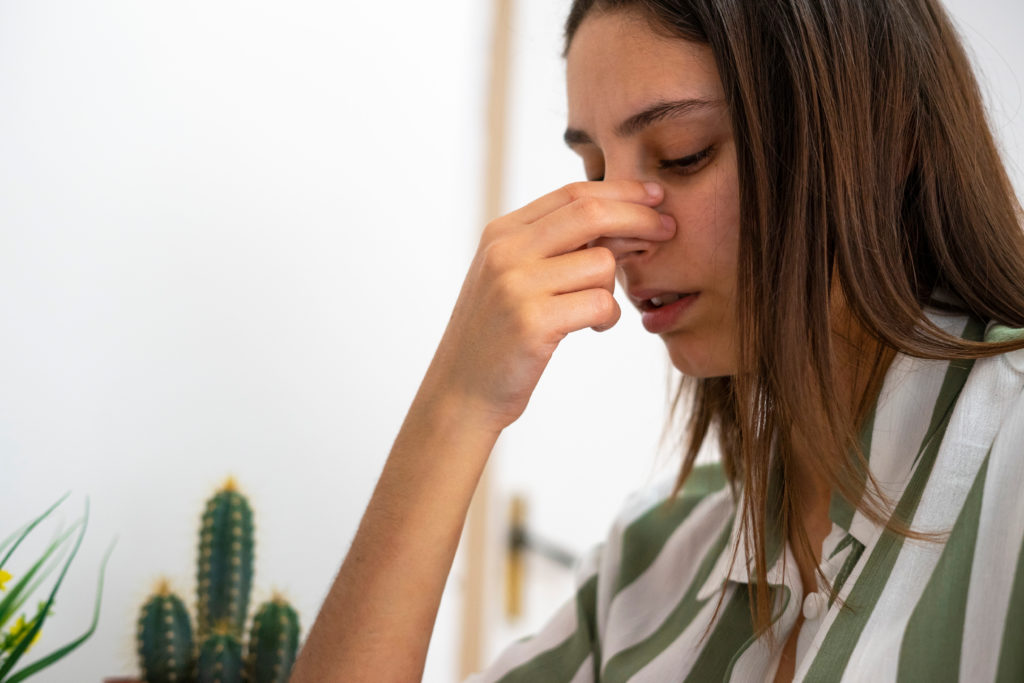October 10, 2022
Six Reasons you Can’t Breathe Through Your Nose
Breathing is supposed to be easy, breezy. After all, it’s natural. Breathe in. Breathe out. The average person takes up to 22,000 breathes every day. You probably don’t even think about it — until you can’t breathe through your nose.
From nasty viruses and allergies to anatomical anomalies, here’s six on-the-nose reasons you can struggle with a stuffed-up nose.
You’ve got a cold.
Your nose is a frontline soldier of sorts. It leads the way in many situations. It can let you know a mouthwatering food is near. It may even help you fall in love (pheromones, anyone?). It’s also an easy target simply because it sticks out from your face.
With two open nostrils that funnel air into your body, your nose is also one of the easiest ways nasty viruses can enter your body. Happy campers, they multiply in the warm, moist lining of your nasal passages. When the body’s immune response kicks in, your nasal passages swell to fight infection, and you can’t breathe through your nose.
There are lots of over-the-counter cold medicines out there to ease cold symptoms. Look for one that includes “relieve stuffy nose” on the packaging. Try a fine-mist nasal spray to lower swelling in the nasal passages.
You’ve got chronic sinusitis.
Sometimes misery has real staying power. Chronic sinusitis is the unwelcome gift that keeps on giving. A cold may keep you stuffed up for five to 10 days. With chronic sinusitis, you may not be able to breathe through your nose properly for 12 weeks — even if you’ve been using over-the-counter medicines.
An infection that causes swelling in your sinuses could be the reason. See your primary care physician — especially if you also have a runny nose, sore throat, pain around your eyes, headaches or an ear ache. You may need antibiotics or other prescription drugs to clear it up so you can breathe easier.
You’ve got seasonal allergies.
Mother Nature is truly wonderful, right? Except when she’s spewing pollen, grass spores, dust and other particles everywhere. They’re carried on gentle breezes and whipping winds until they find a place to settle.  If they settle in your nostrils, you’ll find it hard to breathe through your nose.
If they settle in your nostrils, you’ll find it hard to breathe through your nose.
You could be allergic to one type of allergen or several. You might only feel miserable during one season of the year or several. Over-the-counter antihistamines and decongestants can help ease symptoms, but you may need to see an allergist, or a doctor who treats allergies, to manage your allergies long term. With allergy testing, the doctor can zero in on the precise culprit triggering your seasonal allergies. Once diagnosed, allergy shots or medications do a good job keeping allergies under control.
You’ve got food allergies.
The cheese-stuffed chile relleno you had at lunch really hit the spot. But now you’re stuffed up and can’t breathe through your nose. The same foods that make your mouth water and stomach happy, can cause a rebellion in your nose.
If your nose becomes plugged up about two hours after eating, it could be caused by a food allergy. Post-nasal drip, mucus, and sneezing are other tell-tale symptoms. Common foods that cause an allergic reaction include shellfish, peanuts, eggs, dairy, wheat and soy. If you don’t know which food your body is rebelling against, keep a food diary to look for any patterns. See your family doctor or an allergist for help finding your food trigger.
You’ve got animal allergies.
You can’t imagine life without your four-legged best friend. Still, along with cuddles and unconditional love, your cat or dog can also make it hard to breathe through your nose. Lots of us are allergic to pet dander (dead flakes of animal skin) or protein in animal saliva.
You don’t need to love your pet less, just try to curb your contact. Don’t let your pet rub against your face and wash your hands after petting them. Keep pets off your bed. If you have animal allergies, your pet needs to sleep in its own bed. Allergy shots and medications have helped countless people peacefully coexist with their critters, sans the itchy, watering eyes and stuffed-up nose. Talk to your doctor.
You’ve got a deviated septum.
The human body is all about symmetry. Your two eyes and two ears rest in the same place on opposite sides of your head. And although you only have one nose, it has two nostrils. A thin wall (nasal septum) separates the left and right nasal passages. Normally, they’re the same diameter to make breathing easier.
If your nose is crunched during a soccer match or fender bender, the wall can be knocked out of place. One nostril is crushed, while the other becomes larger — making it harder to breathe through your nose.
Some people are born with a deviated septum. Nose bleeds, facial pain, chronic sinus infections and snoring are other common symptoms. Medications to lower swelling can help, but surgery is often needed to repair the septum.
You’ve got polyps.
The nose comes in lots of beautiful sizes and shapes. It gives the face character. And for the most part, it’s pretty low maintenance. What you see is usually what you get. But not always. The nostrils, nasal passages and sinuses, can sometimes hide soft, painless, noncancerous growths. Called polyps, these growths are caused by chronic allergies, sinus infections or asthma.
If the nasal polyps are small, you may not even know you have them. Larger ones make it harder to breathe through your nose. Medications can often shrink or eliminate polyps. Some need surgery to be removed.
If you struggle to breathe through your nose for two or more weeks, tell your doctor. Stay on top of all your regular wellness checks. It’s the best way to make sure health issues are found early when they can be treated more easily.
DISCLAIMER
The information featured in this site is general in nature. The site provides health information designed to complement your personal health management. It does not provide medical advice or health services and is not meant to replace professional advice or imply coverage of specific clinical services or products. The inclusion of links to other web sites does not imply any endorsement of the material on such websites.